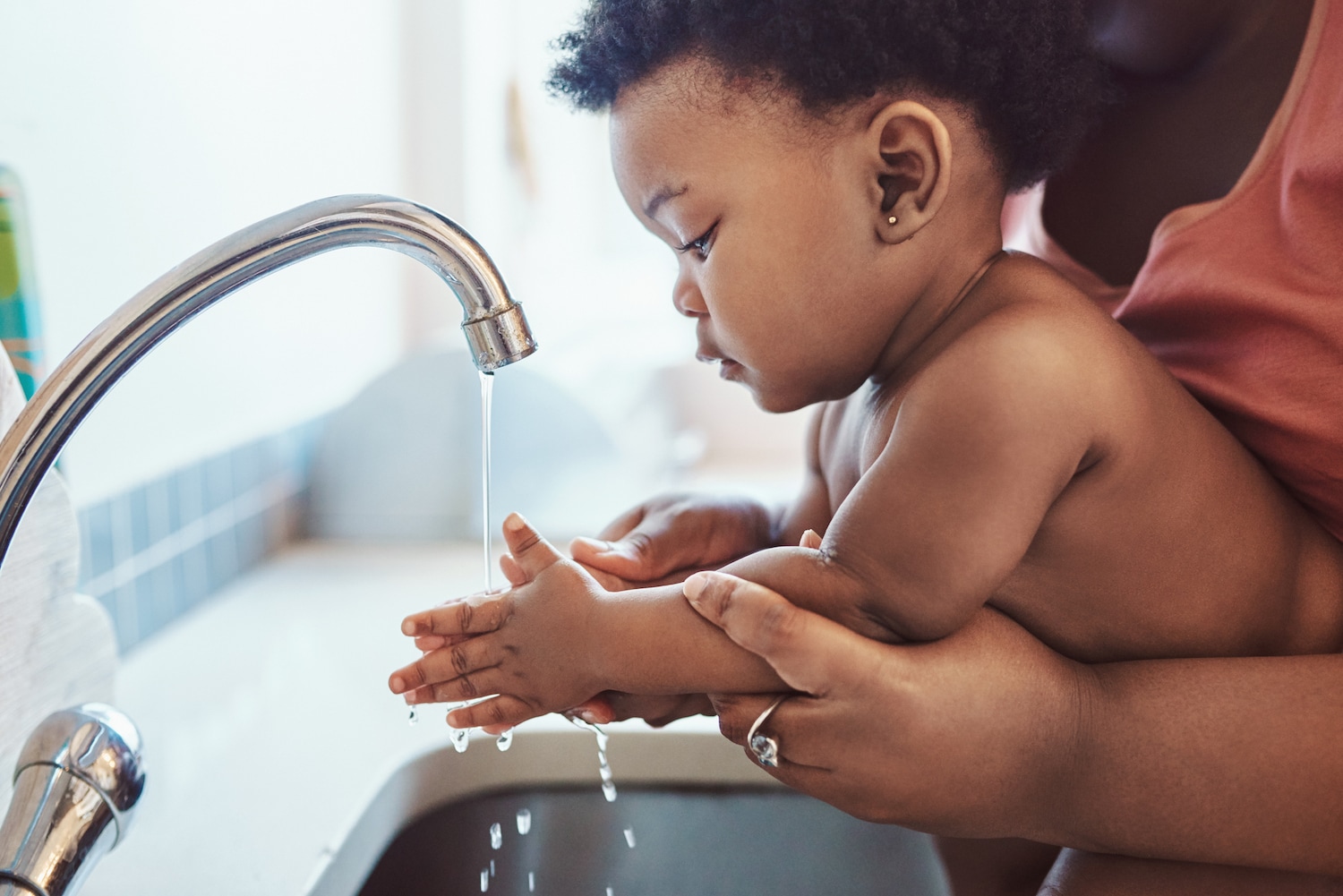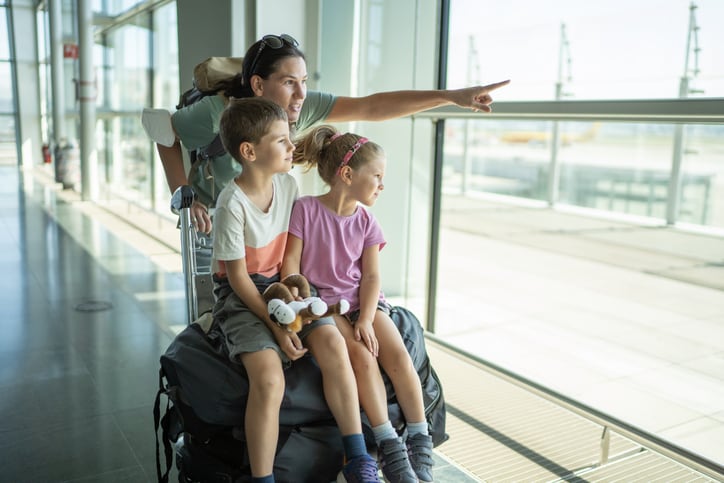For babysitters and nannies seeking work, or those currently employed caring for little ones, it’s a climate fraught with (low- and/or high-grade) anxiety, thanks to COVID. In addition to children under 5 still not being eligible for vaccination, kids aren’t exactly known for their stellar hygiene skills or uncanny ability to maintain social distance. However, professional caregivers still need to work, and for many moms and dads, their services are needed now more than ever.
While things aren’t quite as bleak as they were in 2020, the omicron surge has proven to be yet another unwelcome bump in the pandemic. “It’s hard to predict where the virus is going to take us,” says Dr. Mary Rodgers, principal scientist at Abbott and infectious disease expert. “But currently, omicron — now the dominant variant — has led to more than three times as many new cases as any previous wave of COVID-19.” In other words, even though studies have shown omicron to be less severe than other variants, now’s not the time to let your guard down at work.
Want to stay as safe as possible while caring for kids or looking for child care work? Here’s what the experts suggest.
1. What do I need to know in terms of COVID and child care work right now?
There are a number of things to take into account when it comes to being a child care provider during the current COVID surge. “First, nannies and babysitters should consider their own personal risks, which include any underlying medical conditions they or any of their family members may have,” says Dr. Alok Patel, a pediatrician at Lucile Packard Children’s Hospital at Stanford and host of “Parentalogic.” “Then, caregivers should try and get a sense of the family’s risk status.”
“First, nannies and babysitters should consider their own personal risks, which include any underlying medical conditions they or any of their family members may have.”
— DR. ALOK PATEL, PEDIATRICIAN
Regardless of risk factors, Patel notes that “without question, all potential caregivers should make sure they’re fully vaccinated, including boosters, and should ask the vaccination status of any family they plan on, or are, working with.”
Another thing to consider is the local transmission rate and vaccination rate in your area, along with any potential exposures you may have while caring for others, Patel adds. “I personally know one nanny who took care of a young child who had heart disease,” he says. “She made it a point to not travel, consistently wore a mask and limited all potential exposures while caring for that child.”
Finally, make sure the lines of communication are always open between you and your employer, so expectations and understandings are clear. “Open, honest communication is key to building trust and assessing risk in any caregiver situation,” Patel explains. “Caregivers should feel empowered to have a candid conversation with any family they consider, or are, working with.”
“Caregivers should feel empowered to have a candid conversation with any family they consider, or are, working with.”
— DR. ALOK PATEL
2. What should I discuss in advance with my employer families?
Whether you’re continuing child care for your regular family or interviewing to work with a new family, you may want to consider putting agreed-upon safety practices around COVID into your existing or new nanny contract or babysitter contract. If you don’t have a contract, have a discussion about COVID safety protocols before taking a job or going to work.
Dr. Brandon Brown, an epidemiologist at the School of Medicine at UC Riverside, recommends discussing the following on the front end to mitigate the risk of getting sick:
- Regularly ask the family if they or their children are symptomatic.
- Regularly ask the family if they know they have been exposed to someone with COVID.
- Ask if the family and children they are caring for are vaccinated and boosted.
- Ask about masking guidelines for themselves and for the family.
- Discuss everyone’s comfort level with regular testing.
3. What specific safety precautions should I take on the job to protect everyone’s health during COVID?
Brown notes that one of the most important things to do to stay safe is to make sure you’re fully vaccinated and boosted. Additionally, he, Patel and Rodgers recommend the following:
- Wearing a high-quality mask, such as an N95 or KN95. “If neither of those are an option, wearing a three-layered mask, such as a surgical mask with a cloth mask over it will work,” according to Patel.
- Social distancing when possible.
- Washing hands frequently for 20 seconds with warm water and soap.
- Being aware of the family’s vaccination status.
- Being aware if you’re in an area of high or substantial transmission.
Further, the Centers for Disease Control and Prevention (CDC) recommends the following:
- Avoiding sharing dishes, towels, bedding, electronics, etc.
Brown also notes that it’s important to know that “many possible symptoms of omicron may be similar to the common cold.” If either you or the child you’re caring for aren’t feeling well, stay home and/or test, if possible.
“Many possible symptoms of omicron may be similar to the common cold.”
— DR. BRANDON BROWN, EPIDEMIOLOGIST
“With omicron being a highly transmissible variant, it’s crucial for people to know if and when they’re infectious, which is why it’s a good idea to have rapid antigen tests, like the BinaxNOW self-test, on hand, if possible,” Rodgers says. Patel adds: “In the event a caregiver has an exposure or even feels symptomatic, rapid tests are an efficient way to assess risk.”
4. What about general hands-on care that goes along with child care?
Caring for kids is a very hands-on job, especially when it comes to babies and toddlers who need to be held, fed, changed and cared for. And even when it comes to caring for older kids, most caregivers are used to showing some level of physical affection, whether it’s a hug or pat on the back for a job well done. So what’s a nanny or sitter to do during this recent surge?
First and most important, “make sure the children are well and not exhibiting any cold symptoms such as runny nose, cough or fever,” says Dr. Florencia Segura, a pediatrician at Einstein Pediatrics in Vienna, Virginia.
With older kids, Segura says to make sure that you are practicing good hand-washing skills. “It is also prudent while caring for young children to not kiss babies (as cute as they are) or share food with them due to the concern of transfer of infected droplets,” she says. “Children can be asymptomatic carriers; therefore, even if they are not exhibiting symptoms, minimizing transfer of any bodily fluids is always in your best interest.”
An important note: While the omicron variant has been found to be less severe in most people, one study also found that it has a higher rate of presenting asymptomatically.
Use it as a teaching moment
While, again, kids aren’t always diligent when it comes to taking the steps necessary to mitigate illness, as their caregiver, you can teach them about germs and help instill good practices. “Caregivers are a crucial part of keeping young kids safe and teaching them healthy habits,” says Patel. “Over the past two years, I’ve heard multiple accounts of nannies being the ones to teach kids how to properly wear a mask, hand wash, physical distance and more.”
“Over the past two years, I’ve heard multiple accounts of nannies being the ones to teach kids how to properly wear a mask, hand wash, physical distance and more.”
— DR. ALOK PATEL
5. Are there any other safeguards I should consider while providing child care during the pandemic?
Any nanny or sitter who continues to provide child care during this time has an obvious increased risk of exposure and sickness. For this reason, you may want to make sure you know your rights and protect your financial well-being as much as possible while maintaining a safe and cordial work environment.
“Have a discussion with the family about benefits and assistance in the event you or someone in the child’s family gets sick,” advises Damien H. Weinstein, an employment lawyer at Weinstein + Klein, a law firm with offices in New York and New Jersey. “Speak with a lawyer to understand your rights and entitlements (if any) beforehand.”
“Consulting with an employment lawyer,” says Weinstein, “will be helpful to understand what types of benefits you’re eligible for, what types of financial or other support would be reasonable to request from your employer and what rights you have as an employee.”
It’s also a good idea to have a nanny contract or babysitter contract, which lays out sick days, your schedule and what’s expected.
6. How can I maintain a good working relationship when there are more stressors and everything is in flux?
In short: Be as flexible as you can. Everyone is having a rough go. “Given how incredibly contagious coronavirus is and how rapidly the situation changes, both caregivers and families should be prepared for plans to change at a moment’s notice — whether it be a caregiver having to stay home or a family needing to find alternative child care plans,” says Patel, who admits to having his own COVID-induced child care issues recently. “Over the holidays, we went nearly three weeks without our beloved nanny, which prompted travel and work changes. This is reality, especially when we’re all trying to do what’s best for those around us. Be prepared for anything!”
“Communication, respect, and trust are more important than ever when it comes to the child care provider-family relationship,” he adds. “We’re all in this together.”



